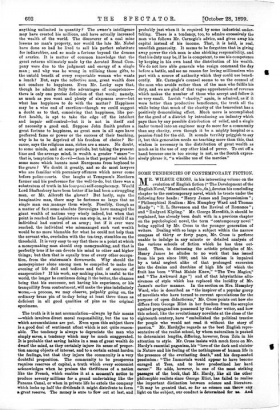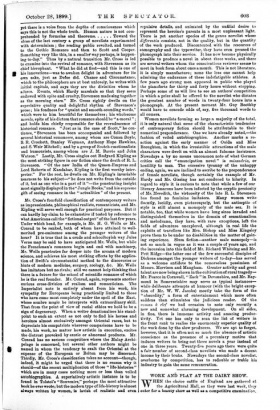SOME TENDENCIES OF CONTEMPORARY FICTION.
31 R. WILBUR CROSS, in his interesting volume on the evolution of English fiction (" The Development of the English Novel," Macmillan and Co., 6s.), devotes his concluding chapter to the contemporary novel, which he treats under the following four heads : "Henry James and Impressionism"; "Philosophical Realism : Mrs. Humphry Ward and Thomas Hardy "; "R. L. Stevenson and the Revival of Romance"; and " Rudyard Kipling." Mr. George Meredith, it should be explained, has already been dealt with in a previous chapter on the psychological novel, the term "contemporary novel being applied by Mr. Cross to the younger generation of writers. Dealing with so large a subject within the narrow compass of thirty or forty pages, Mr. Cross is perforce unable to indulge in any minute or detailed analysis of the various schools of fiction which he has thus out- lined. Thus, in discussing the artistic principles of Mr. Henry James he alludes to no work that has issued from his pen since 1890, and his criticism is impaired by a total neglect alike of that prolonged excursion into the drains and dustbins of high life (of which the fruit has been "What Maisie Knew," "The Two Magics," and " The Awkward Age ") and of that labyrinthine allu- siveness of style which has replaced the lucidity of Mr. James's earlier manner. In the section on Mrs. Humphry Ward, who is described as "the inspirer of a popular group of novelists who have turned to current speculations for the purpose of open didacticism," Mr. Cross points out how she differs from George Eliot in her freedom from the scruples against propagandism possessed by the elder writer, and how this school, like the revolutionary novelists at the close of the eighteenth century, have "embellished the political treatise for people who would not read it without the story of passion." Mr. Hardy:he regards as the beat English repre- sentative of the realist school, by whom naturalism is pushed to determinist lengths, differing, however, from Zola in his attention to style. Mr. Cross insists with much force on Mr. Hardy's essential paganism, his "love of the dark and sinister in Nature and his feeling of the nothingness of human life in the presence of the everlasting death," and his deep-seated pessimism: "The Immortals would appear to have become enraged at Tess, and to have predestined her hard career." He adds, however, in one of the most striking passages of the book, that Mr. Hardy, like all the other philosophic realists since George Eliot, has failed to realise the important distinction between science and literature. "It may be granted that, so far as science can throw any light on the subject, our conduct is determined for as. And
yet there is a voice from the depths of consciousness which says this is not the whole truth. Human nature is not com- prehended by formulas and theorems Toward the close of the last century a group of novelists experimented with determinism ; the reading public revolted, and turned to the Gothic Romance and then to Scott and Cooper. Something very like this, in a smallet way perhaps, is happen- ing to-day." Thus by a natural transition Mr. Cross is led to examine into the revival of romance, with Stevenson as its chief hieropbant. "What he did at first—and this is one of his innovations—was to awaken delight in adventure for its own sake, just as Defoe did. Chance and Circumstance, which to the philosophers are at best unlovely, he writes with initial capitals, and says they are the divinities whom he adores. Events, which Hardy marshals so that they seem endowed with spite and cruelty, Stevenson made sing together as the morning stars." Mr. Cross rightly dwells on the superlative quality and delightful rhythm of Stevenson's prose ; his fondness for "quaint and smooth-sounding words," which were to him beautiful for themselves ; his wholesome morals, spite of his dictum that romance should be "a-moral " ; and holds him chiefly responsible for the recrudescence of historical romance. "Just as in the case of Scott," he con- tinues, "Stevenson has been accompanied and followed by several historical romancers, among whom are Conan Doyle, S. R. Crockett, Stanley Weyman, Anthony Hope Hawkins, and S. Weir Mitchell ; and by a group of Scotch emotionalists and humouriste, among whom are J. M. Barrie and John Watson." Lastly, Mr. Cross singles out Rudyard Kipling as the most striking figure in our fiction since the death of R. L. Stevenson. "Of the new India of the Queen-Empress and Lord Roberts of Kandahar, Kipling is the first worthy inter- preter." For the rest, he dwells on Mr. Kipling's invariable nearness to his subject—" he does not write from the outside of it, but as one who is a part of it "—the penetrating insight most signally displayed in the "Jungle Books," and his supreme gift of seeing romance in the " actualities " of the present.
Mr. Cross's fourfold classification of contemporary writers as impressionists, philosophical realists, romanticists, and Mr. Kipling will serve well enough for practical purposes. But it can hardly lay claim to be exhaustive if tested by reference to what Americans call the "fictional output" of the last few years. Under which head, for example, is Mr. H. G. Wells or Mr. Conrad to be ranked, both of whom have attained to well- merited pre-eminence among the younger writers of the hour? It is true that in a crude and schoolboyish way Jules Verne may be said to have anticipated Mr. Wells, but while the Frenchman's romances begin and end with machinery, Mr. Wells penetrates far deeper into the arcana of modern science, and achieves his most striking effects by the applica- tion of Swift's circumstantial method to the discoveries or hints of modern medicine, surgery, zoology, ez,c. Mr. Wells has imitators but no rivals; still we cannot help thinking that there is a future for the school of scientific romance of which he is the real founder. Mr. Conrad, again, represents another curious cross-division of realism and romanticism. The Imperialist note is entirely absent from his work, his sympathy for Europeans being practically limited to those who have come most completely under the spell of the East, whose sombre magic he interprets with extraordinary skill. That from the point of view of racial ethics we hold to be a sign of degeneracy. When a writer denationalises his stand- point to such an extent as not only to find his heroes and heroines almost exclusively amongst Oriental races, but to depreciate his compatriots wherever comparisons have to be made, his work, no matter how artistic in execution, excites the distrust provoked by exotic or abnormal products. Mr. Conrad has no serious competitors where the Malay Archi- pelago is concerned, but several other authors might be named in whom the tendency to exalt the Oriental at the expense of the European or Briton may be discerned. Thirdly, Mr. Cross's classification takes no account—though, indeed, it might be urged that there is no reason why it should—of the recent multiplication of those "life-histories" which are in many cases nothing more or less than veiled autobiographies. A superlatively artistic instance is to be found in Tolstoi's "Souvenirs," perhaps the most attractive book he ever wrote; but the modern type of life-history is almost always written by women, is lavish of realistic and even
repulsive details, and animated by the unfilial desire to represent the heroine's parents in a most unpleasant light. There is yet another species of the genus novelist whose differentia consists, not in the quality, but in the quantity of the work produced. Discontented with the resources of stenography and the typewriter, they have even pressed the phonograph into their service. It has now become physically possible to produce a novel in about three weeks, and there are several writers whom the conscientious reviewer seems to meet in book form about once a month. This is not literature, it is simply manufacture; none the less one cannot help admiring the endurance of these indefatigable athletes. A few years ago strong men appeared in public who played the pianoforte for thirty and forty hours without stopping. Perhaps some of us will live to see an authors' competition in which a prize shall be offered to the novelist who dictates the greatest number of words in twenty-four hours into a phonograph. At the present moment Mr. Guy Boothby would have to concede odds of, say, five thousand words to all comers.
Women novelists forming so large a majority of the total, it is only natural that some of the charact.!ristio tendencies of contemporary fiction should be attributable to their numerical preponderance. One we have already noted,—the fashion of veiled autobiographies. Another marks a re- action against the early manner of Oujda and Miss Broughton, in which the irresistible attractions of the male characters were dwelt on with an almost fulsome insistence. Nowadays a by no means uncommon note of what German critics call the "emancipation novel" is misandria, or hostility to man. The excessive tyranny of the unhappy ending, again, we are inclined to ascribe to the preponderance of female novelists, though certainly the example of Mr. Hardy and Mr. Gissing has not conduced to hilarity. In regard to style it is curious to note that while a few of our literary Amazons have been infected by the cryptic preciosity of Mr. Meredith, the virtuosity of the late R. L. Stevenson has found no feminine imitators. Many women write fluently, lucidly, even picturesquely, but the antiseptic of style is still almost a monopoly of the male sex. It is notable, too, that while women have long since invaded and distinguished themselves in the domain of sensationalism and melodrama, they have, with rare exceptions, left the fields of adventure unexplored, although in real life the exploits of travellers like Mrs. Bishop and Miss Kingsley prove them to be under no disabilities in the matter of gain- ing experience. Slum fiction—another male monopoly—is not so much in vogue as it was a couple of years ago, and the incursion into this field of Mr. Richard Whiteing and Mr. Pett Ridge—the latter one of the few successful disciples of Dickens amongst the younger writers of to-day—has served as a welcome antidote to the remorseless pessimism of Messrs. Morrison and Maugham. Greater activity and great talent are now being shown in the cultivation of rural tragedy— Mr. Pearce in Cornwall, "Zack "in Devonshire, and Mr. Ray- mond in Somersetshire may serve as typical instances— while deliberate attempts at humour (with the bright excep- tion of Mr. W. W. Jacobs) mostly take the form of the "absurdity," a form of entertainment which more often saddens than stimulates the judicious reader. Of the roman a clef we had occasion to note only recently a new and somewhat alarming development. On all sides, in fine, there is immense activity and amazing produc- tivity. Yet one has only to scan the list of writers in the front rank to realise the enormously superior quality of the work done by the slow producers. We are apt to forget, however, that it is often not so much the absence of artistic conscience as the presence of a pecuniary motive that induces writers to bring out three novels a year instead of one in three years. Twenty-five years ago there were quite a fair number of second-class novelists who made a decent income by their books. Nowadays the second-class novelist, overborne by competition, has to redouble or treble his industry to gain the same remuneration.







































 Previous page
Previous page